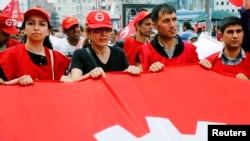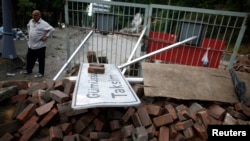Anti-government protesters in Turkey have given the deputy prime minister a list of demands, including firing officials responsible for using force against the marchers.
Deputy Prime Minister Bulent Arinc met Wednesday with demonstrators who are demanding freedom for all jailed protesters. They also insist the government give up plans to tear down a public park in Istanbul.
Thousands of striking Turkish workers took to the streets of Istanbul Wednesday, joining in mass protests calling for Prime Minister Recep Tayyip Erdogan to step down.
Members of Turkey's major trade unions banged drums and carried banners as they made their way to Taksim Square, the site of demonstrations that began last Friday.
Similar protests were held in the capital, Ankara, and other Turkish cities. At least two people have been killed in the unrest and and thousands injured.
Police used tear gas and water cannons overnight to disperse protesters in Ankara and Istanbul. In the port city of Ismir, police arrested 25 people for allegedly "stirring insurrection" by posting comments about the protests on social media.
Deputy Prime Minister Bulent Arinc met with leaders of a civil group whose initial protest to stop authorities from ripping up trees in Taksim Square sparked the nationwide demonstrations. The activists urged the government to release arrested demonstrators, ban police from gassing protesters and fire police chiefs in cities where excessive force was used.
The protests that began last Friday have continued into a sixth day, as have calls for Erdogan to resign. Critics accuse him of governing in an authoritarian manner and imposing his Islamic views on a secular nation.
Turkish leaders have tried to calm the situation, while the country's international allies have urged both authorities and protesters to keep the assemblies peaceful.
U.S. Secretary of State John Kerry said late Tuesday the violence has raised concerns around the world, and that only Turks can solve the underlying problems.
He highlighted U.S. support for the freedom of assembly and the press, and said the most powerful countries will be the ones with open societies and political systems.
Deputy Prime Minister Bulent Arinc met Wednesday with demonstrators who are demanding freedom for all jailed protesters. They also insist the government give up plans to tear down a public park in Istanbul.
Thousands of striking Turkish workers took to the streets of Istanbul Wednesday, joining in mass protests calling for Prime Minister Recep Tayyip Erdogan to step down.
Members of Turkey's major trade unions banged drums and carried banners as they made their way to Taksim Square, the site of demonstrations that began last Friday.
Similar protests were held in the capital, Ankara, and other Turkish cities. At least two people have been killed in the unrest and and thousands injured.
Police used tear gas and water cannons overnight to disperse protesters in Ankara and Istanbul. In the port city of Ismir, police arrested 25 people for allegedly "stirring insurrection" by posting comments about the protests on social media.
Deputy Prime Minister Bulent Arinc met with leaders of a civil group whose initial protest to stop authorities from ripping up trees in Taksim Square sparked the nationwide demonstrations. The activists urged the government to release arrested demonstrators, ban police from gassing protesters and fire police chiefs in cities where excessive force was used.
The protests that began last Friday have continued into a sixth day, as have calls for Erdogan to resign. Critics accuse him of governing in an authoritarian manner and imposing his Islamic views on a secular nation.
Turkish leaders have tried to calm the situation, while the country's international allies have urged both authorities and protesters to keep the assemblies peaceful.
U.S. Secretary of State John Kerry said late Tuesday the violence has raised concerns around the world, and that only Turks can solve the underlying problems.
He highlighted U.S. support for the freedom of assembly and the press, and said the most powerful countries will be the ones with open societies and political systems.






